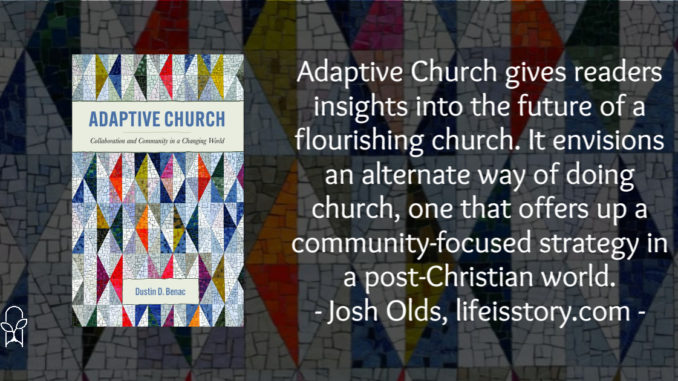
Published by Baylor University Press on August 1, 2022
Genres: Academic
Buy on Amazon
Goodreads

Christian organization, education, and leadership are changing. Headlines note rising religious disaffiliation ("the Nones"), moral failures by religious leaders, and the mounting crisis for religious education. Research on congregations, Christian higher education, and theological education also paints a dismal picture: declining engagement and growing fragility. These trends have changed the landscape that surrounds Christian thought and practice, but the story of local communities presents a more complex portrait: communities are also coalescing around vitality, wisdom, and hope.
Adaptive Church explores what it takes for communities of faith to respond to uncertainty and shifting organizational environments. Based on fifty-two interviews and four years of empirical work, Dustin Benac charts a theological paradigm for collaboration and community in a changing world. He pioneers an interdisciplinary method that identifies the ecclesial ecology as the primary site to discern how Christian communities and leaders adapt to mounting challenges. Moreover, he provides the first in-depth analysis of a novel form of organizing religious life―a "hub"―by telling the story of how collaborative partnerships are creating new structures of belonging in the Pacific Northwest. Neither megachurches nor denominations, these hubs are networks that anchor religious life within a particular community and facilitate webs of connection across Christian institutions. Illumined by wisdom drawn from the Christian tradition, they pursue a particular way of life, one sustained by six complementary forms of leadership that express the possibility of collaboration and community in a changing world.
Benac contributes to a new and emerging field at the intersection of practical theology, organizational theory, sociology of religion, and leadership studies. For leaders and communities facing uncertainty, Adaptive Church provides a template for change within and beyond the forms that have historically guided Christian organization, education, and leadership.
There are a lot of books on how to do church. And a lot of ways that the word “do” gets defined. Some books are about ecclesiology, some books are about marketing, some books are about leadership, some books are about church business—you get the idea. Very rarely does a book break the mold of how we, almost regardless of denomination or ecclesiology—do church. Dustin D. Benac’s Adaptive Church: Collaboration and Community in a Changing World envisions an alternate way of doing church, one that breaks the typical mold and offers up a more community-focused strategy in a post-Christian world.
Based on fifty-two interviews and four years of empirical research, Adaptive Church is an academic study of how church communities can grow and thrive in an increasingly secular world. These churches might not look like churches, but they are more church than most organizations that give themselves that name.
Benac’s study is focused on the Pacific Northwest of the United States, specifically the Parish Collective in Seattle and the Office of Church Engagement in Spokane. He studies how their work with religious and educational organizations benefit individual churches. It’s the story of non-traditional churches focused on community outreach rather than a church service. Set in a world where the church as an institution is looked with suspicion, Adaptive Church offers the alternative of a deinstitutionalized church that eschews much of the power structure that has fallen under suspicion.
Adaptive Church is a thoroughly academic work. It’s published by Baylor University Press by a theology professor in Baylor’s seminary. It’s a qualitative research study that, at times, feels like you’re reading a DMin dissertation. That’s not inherently a negative—Benac’s work was helpful to me in my own DMin research, both for his research and in seeing how a professional researcher presented their work. But because of that academic nature, it is less-accessible and more-specific than many might like. While there is a need for this type of literature, I’d like to se Benac follow up with a trade version of this research that provides readers with a bit more of a guiding structure in emulating the organizations featured here.
For what it’s worth, I live in the United Kingdom—a place even more post-Christian than the PNW—and have used Benac’s research to make adaptations to my own ministry models. I truly think that this phenomenon that Adaptive Church is studying is the way forward for the church. Rather than presented the church’s need to adapt to survive as a negative, Benac finds the positives, noting how collaboration and community can bring about a better church than culture and consumerism.
Adaptive Church is a dense work. It takes time to read through it. As a researcher, Benac is mostly content to share his findings without much interpretation. He has an agenda, but he lets the data speak that agenda for itself. Benac has given readers insights into the future of a flourishing church. The question is whether or not we will follow him into it.
